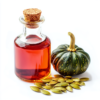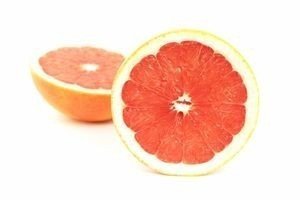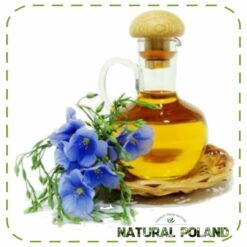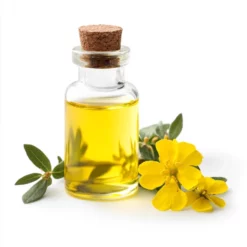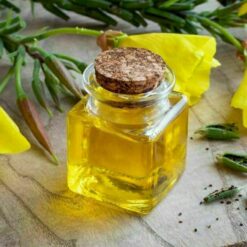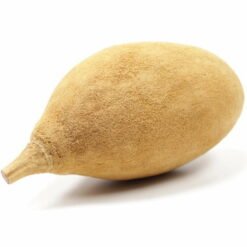Grapefruit seed oil – applications and properties
Alike most fruit, grapefruit is primarily associated with using its flesh for eating. However, grapefruit seeds are also a source of valuable ingredients, in particular the oil.
Grapefruit seed oil is rich in: limonene, b-pinene, y-terpinene, a-pinene, myrcene, aliphatic aldehydes, citronellal, neral, geranial, nootkatone, and coumarin derivatives. Thanks to them, the product is a quality cosmetic ingredient that may be used for aromatherapy.
Grapefruit seed oil has antibacterial, antifungal and antiviral properties. It promotes healing of wounds and acne lesions. The product stimulates circulation. It can be used for tension and depression to reduce their severity. The substance is ideal for fighting apathy, depression and weakness. As a cosmetic ingredient, it helps to fight cellulite as it reduces the amount of water held in the body.
What are the outstanding properties of grapefruit seed oil?
Among all citrus fruits, grapefruit is characterized by the highest contents of flavonoids, which are compounds known for their very high antioxidant properties. Oil derived from its seeds is basically a concentrate of flavones, flavanones and flavonols, as well as a rich source of vitamin C, B group vitamins and tocopherols, i.e. derivatives of vitamin E.
The oil also contains essential oil, including such substances as: limonene, b-pinene, y-terpinene, a-pinene, myrcene, aliphatic aldehydes, citronellal, neral, geranial, nootkatone and derivatives of coumarin.
These substances have anti-inflammatory, antiaging and antiallergenic as well photo-protective properties – they absorb the UVA and UVB radiation.
Health-promoting properties of grapefruit seed oil
Grapefruit oil, as the whole fruit itself, can be consumed orally. The biologically active substances found in its composition are responsible for many health-promoting effects.
Grapefruit seed oil has properties that are favorable for the digestive tract: they support gastric acid and pancreatic juice production, thus supporting good digestion. Moreover, grapefruit seed oil can prevent bloating and constipation, speeds up metabolism and regulates appetite. It is therefore used as a weight loss supporting substance, in particular due to its properties beneficial for the breakdown of fat tissue and removal of excess water from the body.
Grapefruit seed oil is used both orally, as well as in aromatherapy, where it can help with mood balancing. This is due to its calmative and relaxing effects, which make it useful in the treatment of depression, anxiety, insomnia or increased tension of the nervous system.
Compounds found in grapefruit seed oil also improve immunity, have expectorant properties, body cleansing and liver detoxing action, as well as anti-bacterial, anti-fungal and anti-parasitic properties.

Cosmetic applications of grapefruit seed oil
Grapefruit seed oil is also used by the cosmetic industry. Its antimicrobial action is useful in treating skin conditions, such as acne, psoriasis, verrucae, dermatological fungal infections and nagging itchiness, including caused by insect bites.
The antibacterial and anti-seborrheic properties make it an effective addition to greasy hair shampoos. Cosmetic ingredients containing grapefruit seed oil may also be used in warming ointments as well as body modelling and anti-cellulite massage. On the other hand, its antioxidant properties make it an effective ingredient of products removing skin discoloration, protecting the skin against harmful sun radiation and having antiaging effects.
Grapefruit seed oil – is it safe for everyone?
Regrettably, oral use of grapefruit seed oil is not safe for everyone. It contains compounds that can have strong interaction with some medicines, lowering or enhancing their action, thus leading to the risk of serious side effects. The oil should not be consumed while taking hormonal contraceptives, anticoagulant drugs, antibiotics and psychotropic medications.
Literature:
Nowak A, Zielonka J, Turek M, Klimowicz A. Wpływ przeciwutleniaczy zawartych w owocach na proces fotostarzenia się skóry. Postępy Fitoterapii 2014; 2.
https://www.medme.pl/artykuly/wyciag-z-pestek-grejpfruta-wlasciwosci-i-dawkowanie,87309.html
https://www.izielnik.pl/blog/olejek-grejpfrutowy-wlasciwosci-i-zastosowanie-na-odchudzanie-i-cellulit
https://fit.poradnikzdrowie.pl/diety-i-zywienie/co-jesz/grejpfrut-wlasciwosci-lecznicze-i-odchudzajace-grejpfrutow-aa-zAJE-eFri-xCHA.html



